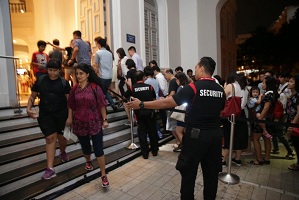Private security officers will be paid up to S$300 more over three years starting 2019, after the government accepted recommendations by the Security Tripartite Cluster. From 2021, their overtime hours will be capped at 72 hours a month — in line with the Employment Act — instead of the current 95 hours under the average arrangement of 12-hour shifts six days a week. Thereafter, exemptions will be issued on a case-by-case basis only to meet short term needs, said the government. The changes will affect about 34,000 security officers employed by more than 240 security agencies here.
The tripartite cluster recommended an increase of S$75 in 2019 to the basic minimum wage of security officers, and another S$75 in 2020, followed by S$150 in 2021. This means a basic wage of at least S$1,400 for security officers under the Progressive Wage Model in 2021 – up from S$1,100, now. For senior security officers and above, the increase will be S$285 over the three years. The current basic wage floor of S$1,300 for senior security officers will rise by S$60 in 2019 and 2020, followed by S$165 in 2021, to hit S$1,585.
The highest increments will take place in 2021 to coincide with the lower cap on overtime hours, so that most officers’ gross wages would not be adversely affected.
Security agencies are encouraged to alternate between five- and six-day work weeks for their officers. From 2022 to 2024, the cluster recommended annual increments of at least 3 percent per annum, subject to review, across all ranks. The higher wages will cost security agencies — and, likely, their clients — 30 to 35 percent more, said Mr Raj Joshua Thomas, president of the Security Association (Singapore). But the changes are necessary, said the cluster, headed by National Trades Union Congress assistant secretary-general Zainal Sapari and which included security agencies.
“As the demand for security services continues to rise with the emergence of new buildings and infrastructure, and given the rising threat of terrorism, further measures are needed to uplift the security industry,” it said. This will attract more and younger Singaporeans to join the sector, and ensure security officers have the skills and competencies to perform their roles well. From Jan 2020, security officers are required to be trained to recognise terrorist threats. Security firms largely welcomed the changes. Mr Thomas said it would improve the professionalism of the sector. “(This means) taking out all of the non-security job functions… and getting them to really focus on access control, patrolling and counter terrorism,” he said.








